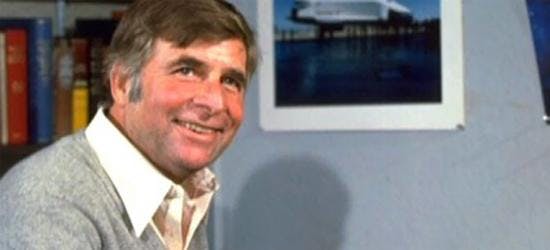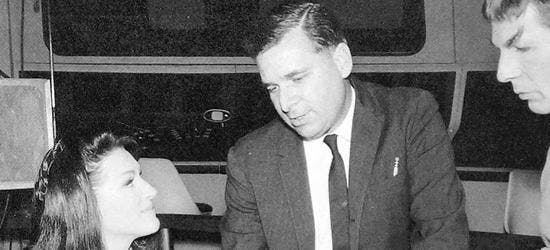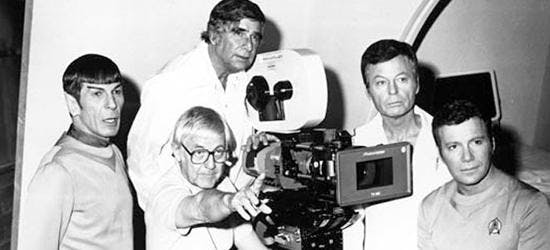Published Aug 18, 2021
How Gene Roddenberry Stayed Connected to Fandom Through Letters
In the pre social media era, Roddenberry still interacted with his fans via snail mail

StarTrek.com
Because of social media, fans waiting in anticipation of the newest Star Trek movie or show are able to interact with the directors, writers, producers and actors instantaneously and often. Back in 1966, however, modern social media was as much science fiction as the universal translator or communicator, yet the original show’s creator Gene Roddenberry and his staff understood even then the value of interacting positively with fans. They did so via letters instead of status updates and especially valuable is the fact that those typed and handwritten communications were often much longer, detailed and thoughtful than can be allowed with social media limitations of characters or space. As part of our ongoing research, the goal of which is to celebrate Trek’s behind-the-scenes artists, we have been studying the communications of Gene Roddenberry, particularly the letters he wrote to fans which are available in his “Gene Roddenberry Star Trek Television Series Collection 1966-1969” archive at the University of California, Los Angeles library.

A conclusion after studying these letters is that Gene Roddenberry, and indeed all his production staff, from secretaries who drafted or typed some of the letters, to producers, writers, consultants and the actors themselves, all had an abiding appreciation for the fans of the show from the get-go in 1966. The letters reveal a sense of humor and camaraderie between fans and the show runners, and a realization of the value that fans had in keeping the show on-air.
Examples of that sense of humor include a fan letter from October 6, 1966, which suggested that perhaps too many of the Star Trek episodes were exciting and engaging – and that to ensure that the show remained on TV for 12 or 15 seasons perhaps some boring episodes should be produced once in a while to achieve a balance. Enchanted with the letter’s suggestion, Gene Roddenberry wrote a memo to NBC executive Herb Schlosser with the proverbial tongue-in-cheek commentary that the letter “contains in it a suggestion for STAR TREK which I am sure NBC will find provocative and may even give us some active help in implementing.” Amused by Gene’s sense of humor, Schlosser hand-wrote a note on the memo, sending a copy back to Roddenberry saying, “You couldn’t + wouldn’t do a dull show! Best Herb.”

Fan requests and questions were taken seriously by the Star Trek production office, another sign of the affinity they had for viewers. For example, in several of the letters fans ask if they could visit the set while on vacation in Los Angeles, and without many exceptions, the answer was an affirmative. There are even instances of very dedicated fans being invited to the set by Roddenberry himself in his replies to their letters! “Fans like you aren’t easy to come by nowadays,” a November 1966 letter revealed to a lucky fan. Three high school science students asked Roddenberry for plans and resource materials on the U.S.S. Enterprise because they hoped to make a model for their class. The fans were rewarded with photographs of the ship and a communication from its designer Walter “Matt” Jefferies. One of the earliest fan letters was mailed right after the episode “Charlie X” premiered, asking for the lyrics to the song the “yeoman” (really Uhura) sang about Spock. The lyrics were promptly sent to the fan.
If Roddenberry or the producers/writers couldn’t answer a question, it was forwarded to someone who could. An example was a December 14, 1966, fan letter asking how the Enterprise could be propelled through space without visible exhaust ports, and providing its own imaginative idea that perhaps the Enterprise was powered by magnetic technologies. The letter was passed along to Harvey P. Lynn, a Rand Corporation physicists who had been the scientific consultant to Gene Roddenberry. Lynn kindly answer the fan’s question with a detailed letter explaining why in the future exhaust would likely consist of light not visible to the eye.

Another demonstration of Roddenberry’s appreciation of fan input was how he would ask for additional copies of fanzines like Spockanalia, so as to be able to distribute them among writers and actors wishing to gain an understanding of how fans were interpreting their work. He would also have fan comments in letters compiled and then write memos to Gene Coon and other producers/writers to further that understanding. For example, one fan questioned early on what the U.S.S. stood for in the name U.S.S. Enterprise – if it was a United Earth Ship as mentioned on screen, shouldn’t the designation be U.E.S. Enterprise? Roddenberry clarifies for his staff that the U.S.S. stands for “United Space Ship.”
All these letters represent a time in fan history that is rare today – handwritten notes and long, typed communications between fans and creators. The letters allowed for genuine exchanges of complex ideas and emotions, something a bit more challenging in a world of electronic and efficient online "interactions." But even during the 1960s, sometimes all it took would be a few words from the Star Trek show runners to convey their appreciation, as this line from a December 4, 1966, letter to a fan reveals: “Your considered opinion is much cared for and much appreciate (sic) by all of us here on the ST staff.”
Maria Jose and John Tenuto are both sociology professors at the College of Lake County in Grayslake, Illinois, specializing in popular culture and subculture studies. The Tenutos have conducted extensive research on the history of Star Trek, and have presented at venues such as Creation Conventions and the St. Louis Science Center. They have written for the official Star Trek Magazine and their extensive collection of Star Trek items has been featured in SFX Magazine. Their theory about the “20-Year Nostalgia Cycle” and research on Star Trek fans has been featured on WGN News, BBC Radio, and in the documentary The Force Among Us. They recently researched all known paperwork from the making of the classic episode "Space Seed" and are excited to be sharing some previously unreported information about Khan's first adventure with fellow fans. Contact the Tenutos at jtenuto@clcillinois.edu or mjtenuto@clcillinois.edu.

